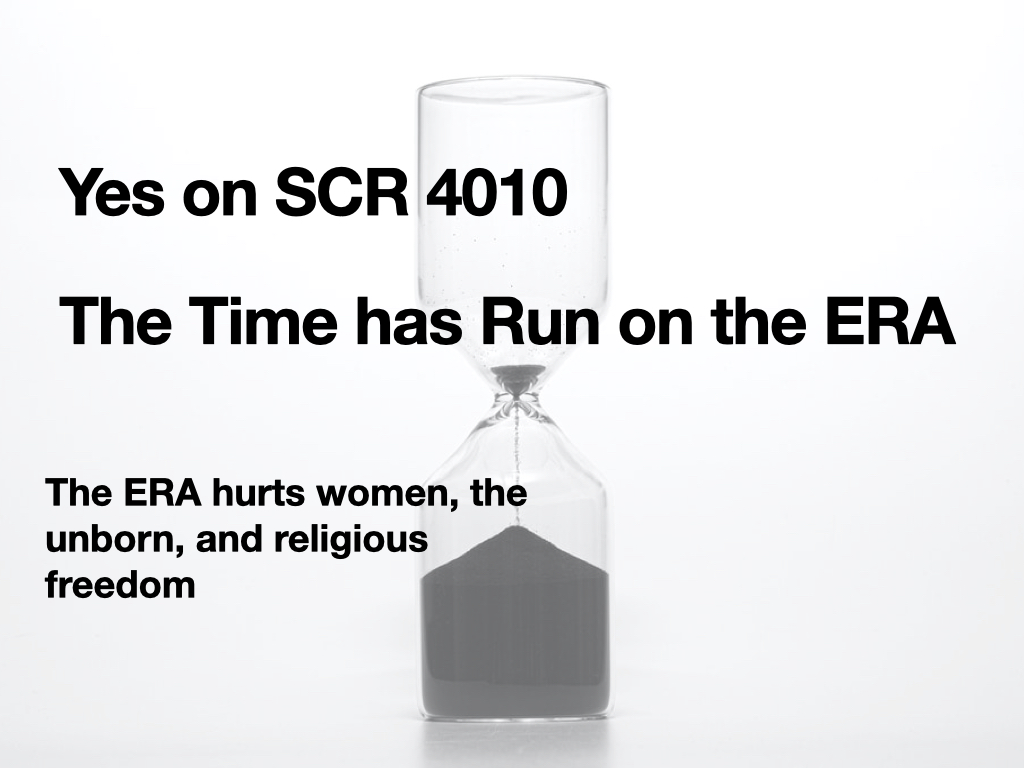
To: House Government and Veteran’s Affairs Committee
From: Christopher Dodson, Executive Director
Subject: SCR 4010 - Equal Rights Amendment
Date: March 18, 2021
The North Dakota Catholic Conference supports Senate Concurrent Resolution 4010.
This resolution is not about whether women and men should be treated with equal dignity. The call for equal respect is rooted in who we are as human persons. It is not about ensuring just wages and fair treatment for women. The Catholic bishops of the United States have advocated for that for over a hundred years. This resolution is solely about whether the time for ratification of the Equal Rights Amendment has passed and about whether Congress and others should attempt to resurrect a dead amendment in light of what we now know about how the amendment, if revived, would be interpreted.
When introduced, the nation’s Catholic bishops opposed the Equal Rights Amendment because of concerns that the word “sex” could be interpreted to mean a “right” to abortion and more. Their concerns proved accurate. “Sex” has since been interpreted by some courts and government agencies to require payment for, and performance of, elective abortions and transgender surgery.1
To demonstrate that this is not a far-fetched claim, we can look to a case close to home.
Passed in 2010, the Affordable Care Act prohibits any federally funded or administered health program or activity — broadly defined — from engaging in discrimination. Rather than listing the types of discrimination prohibited, the act incorporated several nondiscrimination provisions already in federal law, including Title IX, which prohibits discrimination “on the basis of sex.”
Using that provision, Health and Human Services defined “sex” to include “discrimination on the basis of . . . termination of pregnancy, . . . sex stereotyping, and gender identity.”2 It then defined discrimination based on “gender identity” to prohibit a healthcare provider from refusing to offer medical services for gender transitions if that provider offered comparable services, such as gynecological services, to others.3 In short, prohibition on the basis of sex became a mandate to cover and perform elective abortions and transgender surgeries.
Why is this close to home? It is close to home because it impacted health care providers and employers here in North Dakota, including our own state government. In 2016, several Catholic entities, including the Diocese of Fargo, Catholic Charities of North Dakota, the University of Mary, and SMP Healthcare from Fargo, challenged the rules in federal court in North Dakota. Joining them was the State of North Dakota.
The state of North Dakota joined the suit for four reasons. First, the state operates a State Hospital that could have been required to provide elective abortions and transgender surgery. Second, it has a Medicaid program that excludes coverage for elective abortions and gender reassignment surgeries. Third, the state PERS plan excludes coverage for those procedures. Fourth, the state employs healthcare providers who, as state employees, would have had to perform elected abortions and gender reassignment surgery.
Eventually, in January of this year, U.S. District Court Judge Peter Welte in Fargo granted victory to the state and the Catholic plaintiffs, at least for now.4 Appeals might be pending. The judgment is based on procedural matters and that, as applied to the religious plaintiffs, the rules violate the Religious Freedom Restoration Act. What is important for this committee to understand is that it was never disputed, even during the Trump Administration, that the rules, required coverage and performance of elective abortions and gender reassignment surgery and that this requirement stemmed solely from the word “sex.”
The case illustrates the problem with the Equal Rights Amendment. It is not limited to “sex discrimination” as commonly understood. Unjust discrimination can be addressed without the far-reaching Equal Rights Amendment.
Considering the amendment’s threats to human life, state laws, and religious freedom, North Dakota should pass SCR 4010 send a message that its prior ratification no longer stands and that Congress should not attempt to revive a long dead and seriously flawed amendment.
We urge a Do Pass recommendation on SCR 4010.
1 The attached Fact Sheet on the ERA released just last week from the United States Conference of Catholic Bishops summarizes the history and problems with the amendment. https://www.usccb.org/resources/2021.ERA%20Factsheet%20final.pdf
2 Nondiscrimination in Health Programs and Activities, 81 Fed. Reg. 31,467 (formerly codified at 45 C.F.R. § 92.4)
3 “A provider specializing in gynecological services that previously declined to provide a medically necessary hysterectomy for a transgender man would have to revise its policy to provide the procedure for transgender individuals in the same manner it provides the procedure for other individuals.” Id. at 31,455.
4 North Dakota, State of et al v. Burwell et al; The Religious Sisters of Mercy v. Azar; Catholic Benefits Association v. Azar; consolidated in Case 3:16-cv-00386; January 16, 2021. https://www.govinfo.gov/app/ details/USCOURTS-ndd-3_16-cv-00386/USCOURTS-ndd-3_16-cv-00386-0/summary
From: Christopher Dodson, Executive Director
Subject: SCR 4010 - Equal Rights Amendment
Date: March 18, 2021
The North Dakota Catholic Conference supports Senate Concurrent Resolution 4010.
This resolution is not about whether women and men should be treated with equal dignity. The call for equal respect is rooted in who we are as human persons. It is not about ensuring just wages and fair treatment for women. The Catholic bishops of the United States have advocated for that for over a hundred years. This resolution is solely about whether the time for ratification of the Equal Rights Amendment has passed and about whether Congress and others should attempt to resurrect a dead amendment in light of what we now know about how the amendment, if revived, would be interpreted.
When introduced, the nation’s Catholic bishops opposed the Equal Rights Amendment because of concerns that the word “sex” could be interpreted to mean a “right” to abortion and more. Their concerns proved accurate. “Sex” has since been interpreted by some courts and government agencies to require payment for, and performance of, elective abortions and transgender surgery.1
To demonstrate that this is not a far-fetched claim, we can look to a case close to home.
Passed in 2010, the Affordable Care Act prohibits any federally funded or administered health program or activity — broadly defined — from engaging in discrimination. Rather than listing the types of discrimination prohibited, the act incorporated several nondiscrimination provisions already in federal law, including Title IX, which prohibits discrimination “on the basis of sex.”
Using that provision, Health and Human Services defined “sex” to include “discrimination on the basis of . . . termination of pregnancy, . . . sex stereotyping, and gender identity.”2 It then defined discrimination based on “gender identity” to prohibit a healthcare provider from refusing to offer medical services for gender transitions if that provider offered comparable services, such as gynecological services, to others.3 In short, prohibition on the basis of sex became a mandate to cover and perform elective abortions and transgender surgeries.
Why is this close to home? It is close to home because it impacted health care providers and employers here in North Dakota, including our own state government. In 2016, several Catholic entities, including the Diocese of Fargo, Catholic Charities of North Dakota, the University of Mary, and SMP Healthcare from Fargo, challenged the rules in federal court in North Dakota. Joining them was the State of North Dakota.
The state of North Dakota joined the suit for four reasons. First, the state operates a State Hospital that could have been required to provide elective abortions and transgender surgery. Second, it has a Medicaid program that excludes coverage for elective abortions and gender reassignment surgeries. Third, the state PERS plan excludes coverage for those procedures. Fourth, the state employs healthcare providers who, as state employees, would have had to perform elected abortions and gender reassignment surgery.
Eventually, in January of this year, U.S. District Court Judge Peter Welte in Fargo granted victory to the state and the Catholic plaintiffs, at least for now.4 Appeals might be pending. The judgment is based on procedural matters and that, as applied to the religious plaintiffs, the rules violate the Religious Freedom Restoration Act. What is important for this committee to understand is that it was never disputed, even during the Trump Administration, that the rules, required coverage and performance of elective abortions and gender reassignment surgery and that this requirement stemmed solely from the word “sex.”
The case illustrates the problem with the Equal Rights Amendment. It is not limited to “sex discrimination” as commonly understood. Unjust discrimination can be addressed without the far-reaching Equal Rights Amendment.
Considering the amendment’s threats to human life, state laws, and religious freedom, North Dakota should pass SCR 4010 send a message that its prior ratification no longer stands and that Congress should not attempt to revive a long dead and seriously flawed amendment.
We urge a Do Pass recommendation on SCR 4010.
1 The attached Fact Sheet on the ERA released just last week from the United States Conference of Catholic Bishops summarizes the history and problems with the amendment. https://www.usccb.org/resources/2021.ERA%20Factsheet%20final.pdf
2 Nondiscrimination in Health Programs and Activities, 81 Fed. Reg. 31,467 (formerly codified at 45 C.F.R. § 92.4)
3 “A provider specializing in gynecological services that previously declined to provide a medically necessary hysterectomy for a transgender man would have to revise its policy to provide the procedure for transgender individuals in the same manner it provides the procedure for other individuals.” Id. at 31,455.
4 North Dakota, State of et al v. Burwell et al; The Religious Sisters of Mercy v. Azar; Catholic Benefits Association v. Azar; consolidated in Case 3:16-cv-00386; January 16, 2021. https://www.govinfo.gov/app/ details/USCOURTS-ndd-3_16-cv-00386/USCOURTS-ndd-3_16-cv-00386-0/summary
What We Do
The North Dakota Catholic Conference acts on behalf of the Roman Catholic bishops of North Dakota to respond to public policy issues of concern to the Catholic Church and to educate Catholics and the general public about Catholic social doctrine.

Contact Us
North Dakota Catholic Conference
103 South Third Street, Suite 10
Bismarck, North Dakota
58501
1-888-419-1237
701-223-2519
Contact Us

